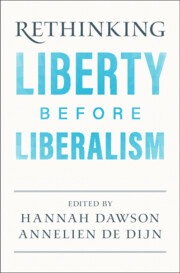Book contents
- Rethinking Liberty before Liberalism
- Rethinking Liberty before Liberalism
- Copyright page
- Dedication
- Contents
- Figures
- Contributors
- Acknowledgements
- Introduction
- Part I Authors
- Part II Hierarchies
- Part III Traditions
- 8 Beyond the ‘Wretched Subterfuge’
- 9 ‘A Just and True Liberty’
- 10 Chains and Invisible Threads
- 11 Neo-Roman Liberty in the Philosophy of Human Rights
- Conclusion
- Bibliography
- Index
11 - Neo-Roman Liberty in the Philosophy of Human Rights
from Part III - Traditions
Published online by Cambridge University Press: 22 February 2022
- Rethinking Liberty before Liberalism
- Rethinking Liberty before Liberalism
- Copyright page
- Dedication
- Contents
- Figures
- Contributors
- Acknowledgements
- Introduction
- Part I Authors
- Part II Hierarchies
- Part III Traditions
- 8 Beyond the ‘Wretched Subterfuge’
- 9 ‘A Just and True Liberty’
- 10 Chains and Invisible Threads
- 11 Neo-Roman Liberty in the Philosophy of Human Rights
- Conclusion
- Bibliography
- Index
Summary
This chapter explores the usefulness of neo-Roman liberty – to live free from subjection, deference, and vulnerability to the arbitrary will of others – for our contemporary philosophical debates about human rights. For eighteenth-century republicans such as Wollstonecraft and Price, liberty understood in this way was conceptually linked to rights of humanity, but that link has been severed. Starting from a sense of perplexity about the disengagement between 'republican' liberty and human rights and the curious inability of mainstream human rights philosophy to deal with major political challenges, neo-Roman liberty is used here to push human rights philosophy onto more radically egalitarian terrain. The critique focuses on the naturalistic bias in human rights thinking, a misunderstanding of international human rights law, a tendency to focus on event-based 'local' principles of justice, and a reluctance to challenge structural causes of injustice. The contention is that Skinner’s neo-Roman liberty serves to establish two important normative premises for a human rights philosophy with more bite: human rights should offer the strongest protection for those who are most vulnerable to socio-economic and political marginalisation, and that objects of human rights should be conceptualised in terms of open-ended goals of justice, predicated on a commitment to structural equality.
Keywords
- Type
- Chapter
- Information
- Rethinking Liberty before Liberalism , pp. 215 - 232Publisher: Cambridge University PressPrint publication year: 2022
- 2
- Cited by

